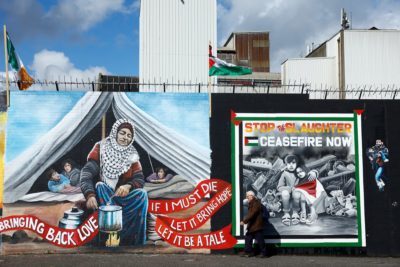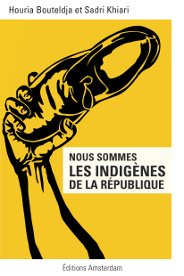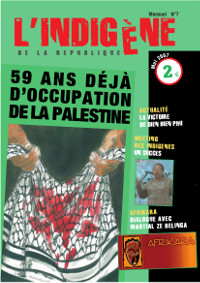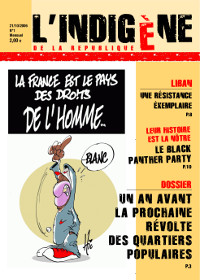Les mobilisations massives à travers le monde en soutien au peuple palestinien et la défense acharnée de l’Etat génocidaire d’Israel par le camp occidental nous ont convaincus de la nécessité d’internationaliser notre regard, et de solliciter des réflexions stratégiques et politiques de mouvements menés ailleurs qu’en France. L’ambition de la présente série d’entretiens est de contribuer au croisement de nos expériences, au service d’un mouvement international en soutien à la Palestine et contre le sionisme, le racisme et le colonialisme.
Nous avons réalisé le quatrième entretien de cette série avec le Dr. Brendan Ciarán Browne, professeur adjoint au Trinity College de Dublin (FTCD) en Irlande. Ses recherches portent sur la justice transitionnelle, le colonialisme de peuplement et le maintien de la « paix » libérale. Son travail le plus récent, « Transitional (in)Justice & Enforcement the Peace on Palestine« , analyse de manière critique les pratiques de justice transitionnelle qui ont été testées en Palestine, en soutenant que de telles interventions imitent un programme libéral profondément défectueux de maintien de la paix, qui a été utilisé comme arme contre la population palestinienne.
1/ Comment était le mouvement de solidarité avec la Palestine dans votre pays avant le déclenchement de cette nouvelle Nakba? Quelle était son histoire et quelles étaient ses composantes, ses forces et ses faiblesses?
Premièrement, ce n’est pas une nouvelle Nakba, c’est la même. Et il est important de garder cela à l’esprit car si on dit que c’est « nouveau », on le détache de tout le contexte de ces 75 dernières années. C’est l’aboutissement de la fin du projet colonial. Avant le 7 octobre, le mouvement en Irlande était actif, avec des organisations comme Ireland Palestine Solidarity Campaign (IPSC), le Congrès Irlandais des Syndicats, et d’autres groupes (éducatifs, sociaux, médicaux…) et des individus comme moi faisant les allers-retours entre l’Irlande et la Palestine. Le mouvement était fragmenté mais il existait. Puis, à partir du 7 octobre, le mouvement s’est développé à un point tel que nous avons atteint les cent cinquante mille personnes qui marchaient pour la Palestine à Dublin, ce qui est significatif pour l’ensemble de la population Irlandaise (environ cinq millions). C’est un bon indicateur de l’impact de ce mouvement. De plus, des gens dans les rues ont commencé à en parler, même des gens qui n’en auraient jamais parlé publiquement auparavant. Nous avons eu des représentations politiques, des partis en Irlande qui ont clairement déclaré leur soutien à la lutte palestinienne (Sinn Féin, People before Profits). Et cela existe toujours. Et nous avons maintenant des groupes plus petits qui se forment : Footballers for Palestine, Healthcare workers for Palestine, Social workers for Palestine, etc.
2/ Comment la lutte a-t-elle été organisée dès le début du génocide à Gaza ? Quels étaient ses objectifs, ses forces, ses contradictions et son adversité ? La lutte a-t-elle déjà évolué, et si oui, quels changements ?
L’ISPC a pris en charge le mouvement en Irlande concernant les manifestations et les actions. Ils sont très bien organisés et ils ont une grande plateforme en Irlande. Ils sont basés à Dublin, mais ils ont des branches partout en Irlande. Ils dirigent donc ce mouvement en croissance.
Cependant, cela engendre des défis lorsque votre mouvement grandit et que tout le monde a une vision différente de la solidarité, de l’action ou de la résistance, le mouvement change et les relations se tendent. Des négociations commencent à avoir lieu, et je pense que c’est là où nous en sommes actuellement. C’est là que nous devenons les plus faibles et les moins utiles à la lutte globale. Par exemple, l’une des traditions de la Saint-Patrick en Irlande est que les partis politiques se rendent à la Maison-Blanche. Cette année, cela a été contesté par les mouvements populaires. Cela a créé une tension entre les militants. Les gens se faisaient crier dessus quand ils faisaient un discours sur scène. Divisés, les groupes sont facilement contrôlables, donc ils perdent de la force.
Ils se divisent également sur le langage de la résistance et sur la façon dont nous discutons notre vision de l’avenir. C’est une très grande conversation parce que je ne pense pas que les groupes de solidarité devraient imposer leur vision d’une Palestine décolonisée. Ce n’est pas notre rôle. Notre rôle est d’amplifier la voix des opprimés et de soutenir leurs demandes légitimes. J’essaie d’éviter ces groupes, et je ne suis membre d’aucun groupe de solidarité. J’étais en Afrique du Sud lors d’un voyage de conférence, et ils sont très loin en termes de mouvement décolonial. Ils sont très sensibles aux limites du mouvement et au danger d’imposer ou de suggérer une vision à la Palestine. C’était rafraîchissant d’être là-bas parce que parfois j’ai l’impression que les mouvements de solidarité en Irlande sont performatifs alors qu’en Afrique du Sud, c’est très lié à leurs expériences quotidiennes de racisme, oppression, promesses non tenues, injustice…
Les Sud-Africains sont conscients des limites de leurs mouvements Anti-Apartheid, et toutes ces choses sont au centre de la lutte palestinienne. C’est ce qui m’inquiète au sujet de certains groupes de solidarité. On ne sait pas ce que c’est de vivre dans certains contextes. L’expérience du racisme à Paris n’est pas la même que celle vécue en Irlande il y a des décennies, et elle n’est évidemment pas la même que celle vécue aujourd’hui par les Palestiniens. Pour cette raison, même si j’ai vécu quinze ans en Palestine, enseigné dans des universités là-bas, dirige un projet de deux millions de dollars sur place, je suis toujours très sélectif et prudent sur ce que j’écris concernant la Palestine. Trop de personnes dans les mouvements de solidarité assument cette posture de « nous savons mieux ».
Malheureusement, il n’y a pas assez d’efforts pour amener les voix palestiniennes au mouvement et avoir une conversation sur ce qu’elles veulent, parce qu’en Palestine il n’y a pas de consensus. Les gens ne sont pas d’accord sur la réalité future. Si vous vivez à Ramallah, vous vivez une vie très différente de celle des habitants de Gaza. Même en parlant de décolonisation, à quoi cela ressemble-t-il à Haïfa, à Hébron… Comment décoloniser d’une manière juste ? Que faire des Israéliens? Il n’y a pas de vision commune à ce sujet. Le peuple de Palestine doit trouver un moyen de se rassembler collectivement et de parler de ces questions.
3/ Quelle a été l’attitude des autorités, des partis politiques dominants et des médias dans votre pays ? Le colonialisme des colons israéliens a-t-il des liens économiques et politiques avec votre pays, et sous quelle forme ?
Personne n’ose s’approcher de nos marches. L’Irlande est physiquement divisée (Irlande et Irlande du Nord) mais en termes de mobilisation, personne ne les touche. Nous ne subissons aucune répression de la part des autorités contrairement à la France ou à d’autres pays occidentaux. Il y a de bonnes raisons à cela quand on pense aux relations entre la police et le peuple irlandais qui étaient très compliquées. Dans les villes irlandaises, au nord et au sud, vous verrez des drapeaux palestiniens, des peintures murales. Par exemple, chaque mot du Dr. Refaat Alareer, assassiné en décembre, tiré du poème « Let it be a tale » est peint sur un mur à Belfast. Le soutien est donc tangible.
Politiquement, nous faisons beaucoup de discours parlementaires et il peut sembler que nous sommes très engagés avec la Palestine, mais il y a très peu d’actions concrètes. Bien que le gouvernement irlandais puisse sembler plus vocal que ses voisins européens, il serait inexact de dire que sa position est radicale et qu’elle reflète le sentiment pro-palestinien du mouvement populaire de solidarité irlandais. Les principaux partis politiques irlandais sont restés conservateurs et alignés sur le projet impérial occidental. Comme dit précédemment, c’est principalement performatif. Par conséquent, cela avance trop lentement et nous avons toujours des liens avec les Israéliens. Par exemple, les avions militaires américains font le plein en Irlande avant de se rendre en Israël (aéroport de Shannon). De plus, il y a encore beaucoup d’universités liées à Israël.
4/ Selon vous, comment serait-il possible de combiner les forces des mouvements soutenant la Palestine sur tous les continents? Quel rôle devraient jouer la diaspora palestinienne et les organisations de résistance ?
Je pense qu’il est essentiel de former des alliances. Les gouvernements agiront toujours selon des intérêts impériaux et capitalistes, tandis que les groupes de solidarité populaire agiront pour le peuple et nous devons trouver ce que nous partageons en termes de vulnérabilité. Nous avons tous des besoins humains fondamentaux (sécurité, logement, nourriture, etc.). C’est donc le seul moyen. À Cape Town, l’événement où j’ai pris la parole était organisé par le groupe anti-pauvreté, ce qui était incroyable parce qu’il établissait un lien entre le problème dans les rues et ce qui se passe en Palestine. Nous avons une vulnérabilité transnationale et internationale commune et nous devons explorer cette élément. Nous devons organiser des événements partagés en ligne et nous rencontrer chaque fois que nous en avons l’occasion. Nous avons déjà un mouvement mondial de solidarité : Boycott Désinvestissement Sanctions (BDS).
En ce qui concerne la diaspora palestinienne, elle devrait être au centre de la question. Le droit au retour central, afin qu’en tant que membre de la diaspora, vous ayez autant de légitimité à parler que quelqu’un qui vit à Jérusalem. Cela ne signifie pas que vous êtes touché de la même façon. Vous pouvez être palestinienne de la diaspora comme Bella Hadid, mais vous n’aurez pas la même expérience que Muhammad el-Kurd qui a grandi là-bas. Cependant, cela ne délégitime pas le droit de participer à la conversation. Et les camarades palestiniens sont très sensibles à cela, il est important de rappeler que le mouvement s’est développé en exil.
Brendan Ciaràn Browne
Entretien traduit de l’anglais par Hanna
“The Palestinian diaspora should be at the center of the issue” (Brendan Ciaràn Browne)
The massive mobilizations around the world in support of the Palestinian people, and the relentless defense of the genocidal state of Israel by the Western camp, have convinced us of the need to internationalize our gaze, and to solicit strategic and political reflections from movements outside France. The ambition of the present series of interviews is to contribute to the cross-fertilization of our experiences, in the service of an international movement in support of Palestine and against Zionism, racism and colonialism.
We conducted the fourth interview in this series with Dr. Brendan Ciarán Browne, Assistant Professor at Trinity College Dublin (FTCD) in Ireland. His research focuses on transitional justice, settlement colonialism and liberal “peacekeeping”. His most recent work, « Transitional (in)Justice & Enforcement the Peace on Palestine », critically analyzes the transitional justice practices that have been tested in Palestine, arguing that such interventions mimic a deeply flawed liberal peacekeeping program, which has been used as a weapon against the Palestinian population.
1/ How was the Palestine solidarity movement like in your country before the outbreak of this new Nakba? What was its history and what were its components, strengths and weaknesses?
First, it is not a new Nakba, it is the same one. And it is important that we keep that in mind because if we say that it is « new », we dislocate it from the whole context of these past 75 years. This is the culmination of the end of the colonial project. Before the 7th October, the movement in Ireland had been active, with organisations such as Ireland Palestine Solidarity Campaign (IPSC), Ireland Trade Unions, and other groups (educational, medical…) and individuals such as myself going back and forth from Ireland to Palestine. The movement was fragmented but it existed. Then, starting from the 7th October, the movement grew to a point that we had around one hundred and fifty thousand people walking in Dublin which is significant for the whole population of Ireland (around five million). It is a good indicator of the impact of this movement. Moreover, people in the streets starting to talk about this, even people that would never have talked about it publicly before. It became normalized. We had political representations, parties in Ireland that declared clearly their allegiances to the Palestinian struggle (Sinn Féin, People before Profits). And that still exists. And we now have smaller groups being formed : Footballers for Palestine, Healthcare workers for Palestine, Social workers for Palestine…
2/ How was the struggle organized from the start of the genocide in Gaza ? What were its goals, strengths, contradictions and adversity? Has the struggle already evolved, and if so, what changes?
The ISPC took charge of the movement in Ireland regarding demonstrations, actions… They are very well organized and they have a big platform in Ireland. They are based in Dublin but they have branches all across Ireland. So they lead the growing movement.
However, that brings challenges when your movement grows and everybody has a different vision of solidarity, action or resistance, the movement changes and it becomes tense. Negotiations take place, and I think it is where we are at this moment. That is when we become at our weakest and less helpful to the overall struggle. For example, one of the Saint Patrick days traditions in Ireland is for the political parties to go to the White House. This year it was called off by the grassroots movements saying it should be cancelled. It created a tension between activists. People were being shouted out on stage when they were giving a speech. Divided, the groups are easily controllable so it looses its strength.
They also divide on language of resistance and how we discuss our vision of the future. It is a very big conversation because I don’t think solidarity groups in any country should be offering a vision of a decolonized Palestine. It is not our role. Our role is to amplify the voices of the oppressed and to follow their legitimate demands. I try to avoid these groups, and I am not a member of any solidarity group. I was in South Africa (SA) on a speaking trip, and they are very far in terms of decolonial movement. They are very sensitive to the limitations of the movement and the danger of imposing or suggesting a vision to Palestine. It was refreshing to be there because sometimes I felt that the solidarity movements in Ireland were performative whereas in SA, it was very much linked to their daily experiences of racism, oppression, filled promises, lack of justice. South Africans are aware of the limitations of their Anti Apartheid movements. And all these things are at the center of the Palestinian struggle.
This is my concerns regarding some solidarity groups. We don’t know what it means to live in certain contexts. The experience of racism in Paris is not the similar to the experience of racism in Ireland decades ago, and it is of course not similar to the Palestinian experience.
For this reason, even if I’ve lived fifteen years in Palestine, teached in Universities over there, have a two million dollars project there, I am always very selective and careful about what I am writing regarding Palestine. Too many people in Solidarity movements assume this personality of « we know best ».
Unfortunately, there is not enough hard work about bringing Palestinian voices to the movement and have a conversation about what they want because in Palestine there is no consensus. People don’t agree on the future reality. If you live in Ramallah, you live a very different life to people that live in Gaza. Even talking about decolonization, what does it look like in Haifa, Hebron … ? How do you decolonize in a justice oriented way ? What to do with the Israelis ? There is no shared vision of that.
The People of Palestine need to find a way to gather as a collective and talk about these issues.
3/ What has been the attitude of the authorities, the dominant political parties and the media in your country? Does Israeli settler colonialism have economic and political links with your country, and in what form?
Nobody dare to come near our marches. Ireland is physically divided (Ireland and Northern Ireland) but in terms of mobilization, nobody touches them. We don’t experience any suppression from the authorities contrary to France or other Western countries. There are good reasons for that when you think about the relations between the Police and the Irish people which was very complicated. In Irish towns and cities, North and South, you will see Palestinian flags, murals. For exemple, every word of Dr Refaat Alaarer -murdered in December- from the poem « Let it be a tale » are printed on a wall in Belfast. So the support is tangible.
Politically, we make a lot of parliamentary speeches and it can seem like we are very engaged with Palestine but there are very little concrete actions. While the Irish government may appear more vocal than its European neighbors, it would be inaccurate to say that its position is radical, and that it reflects the pro-Palestinian sentiment of the grassroots Irish Solidarity movement. The main Irish political parties have remained conservative and aligned with the Western imperial project. As said earlier, it is mostly performative.
Therefore, it is moving too slowly and we still have links with the Israelis. For example, American Military planes are refueling in Ireland before going to Israel (Shannon Airport) . Moreover, there are still a lot of Universities linked with Israel.
4/ In your opinion, how would it be possible to combine the forces of movements supporting Palestine on all continents? What role should the Palestinian diaspora and resistance organizations play ?
I think it is critical to form alliances. Governments will operate in imperial, capital interests whereas grassroots solidarity groups will operate for the people and we need to find what it is that we share in terms of our vulnerability. We all have basic human needs (security, housing, food …). So it is the only way. In Cape Town, the event where I was speaking was organized by the Anti-Poverty group which was amazing because it was linking the problem on the streets there to what is going on in Palestine. We have a shared transnational, international vulnerability and we need to explore that. We need to do shared online events, and meet whenever we have the chance. We already have a global solidarity movement : Boycott Divestment Sanctions (BDS).
Regarding the Palestinian diaspora, it should be at the center of the question. The right of return is one of the key issues so as a member of the diaspora you have as much legitimacy to speak as someone living in Jerusalem. It doesn’t mean that you are impacted in the same way. You can be a diaspora Palestinian like Bella Hadid but you’re not going to have the same experience as Muhammad el-Kurd who grew up there. However, that doesn’t delegitimize the right to be part of the conversation. And Palestinians comrades are very sensitive to that. It is important to remember that the movement was developed in exile.
Brendan Ciaràn Browne
Translated into french by Hanna








